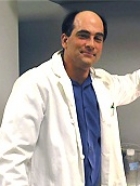Contributing Experts
Anthony Berdis, Ph.D.

Visit:
Dr. Anthony Berdis is currently an Assistant Professor of Pharmacology in the School of Medicine at Case Western Reserve University in Cleveland, Ohio.
Dr. Berdis is considered a leading authority on chemotherapeutic agents, especially nucleoside analogs used as anti-cancer agents. To date, Dr. Berdis has published 60 research papers and review articles in areas involving mechanistic enzymology, drug discovery, and nucleoside analogs as therapeutic agents. He has also co-authored several book chapters and currently holds several patents.
Dr. Berdis received his B.S. in Chemistry from Gannon University in Erie, Pennsylvania. He received his Ph.D. in Biochemistry from the University of North Texas in 1993. His graduate work was performed under the direction of Professor Paul F. Cook and focused on using steady-state kinetic approaches and heavy atom isotope effect measurements to elucidate the kinetic, chemical, and regulatory mechanisms of enzyme-catalyzed reactions. He then performed his NIH-sponsored post-doctoral fellowship under the direction of Professor Stephen J. Benkovic at The Pennsylvania State University. While in Professor Benkovic's group, Dr. Berdis published extensively on several projects ranging from the development of catalytic antibodies as novel bio-catalysts to understanding multi-protein complexes involved in DNA replication.
In 2002, Dr. Berdis began his independent research career at Case Western Reserve University where he continues to study the mechanism of DNA polymerases. His work focuses on developing non-natural natural nucleotides that can function as chemical probes to study DNA polymerase activity on damaged DNA. His research has led to the development of new models invoking the importance of π-electron density as a predominant factor influencing polymerase fidelity during translesion DNA synthesis. In 2006, Dr. Berdis was presented the Henry W. Menn Memorial Award from the Skin Cancer Foundation recognizing his research towards understanding the mechanism of translesion DNA synthesis.